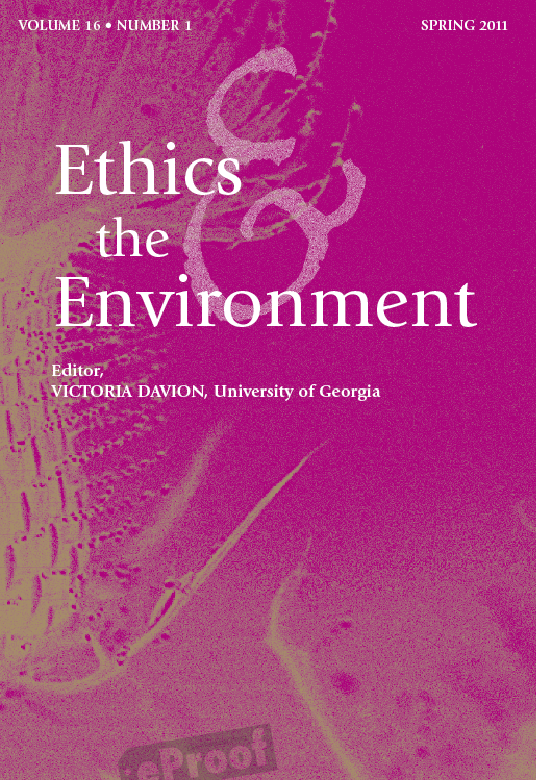Dear Aubrey,
Please count me in as a supporter. I have no time to write anything on it: I am leaving for Europe and a conference I am organizing on Saturday. But please feel free to add my name to your list of supporters.
Laura Westra.Laura Westra, Ph.D., Ph.D.(Law)
Professor Emerita (Philosophy)
University of Windsor
Sessional Instructor, Faculty of Law
Sessional Instructor, Faculty of Law, University of Milano (Bicocca)
Sessional Instructor, Graduate Faculty of Environmental Studies, Royal Roads University
The Global Ecological Integrity Group (GEIG) includes more than 250 scholars and independent researchers worldwide, from diverse disciplines, including ecology, biology, philosophy, epidemiology, public health, ecological economics and international law.Our mandate is to push the boundaries of scholarly endeavour through inter- and trans-disciplinary engagement on matters affecting and governing the sustainability of life for both present and future generations.
It can be argued, if current generations in the developed countries claim sole ownership to the assets that they have inherited from prior generations, then they are also owners of the liabilities associated with those assets, and they are accountable for the excess use of the atmospheric commons by prior generations. As Bhaskar notes, "if I take an object, not knowing that it belongs to you, and give it to my daughter, you are surely entitled to reclaim it, even though neither my daughter nor I may be a thief". Similarly, when one discovers that one has taken more than one's fair share, one is expected to make some form of reparation to the party or parties who were disadvantaged. Past practices of utilizing more than one's fair share of a common trust is not justification for continued had behaviour.To resolve these tensions, the contraction and convergence (C&C) response to climate change challenges seeks a global agreement on the concentration of atmospheric GHGs below which the planer's temperature will not rise more than two degrees Celsius, whether that concentration is set at 350, 400 or 450 parts per million of CO2. When this benchmark is set, the planet's carrying capacity for that concentration of GHGs can then be allocated to nations on a per ca pita basis. Those countries that are presently emitting more than their allotment (primarily the developed, industrialized countries) will be required to reduce their emissions (contraction) while those countries who are presently emitting less than their share (primarily developing countries) will be temporarily permitted to grow their emissions until, by an agreed date, all countries have reached their equal per capita entitlement (convergence)(den Elzen et al 2005). Developing countries might sell their surplus GHG shares during the adjustment phase which would presumably be completed by 2050 (Global Commons Institute 2008).
For the C&C approach to become operational, the signatories to the UNFCCC must agree on a safe concentration of atmospheric GHGs, the proportional allocation of this limited capacity based on national populations, the fair assessment of current levels of emissions, targets for contraction of those national emissions that exceed allocations• and the concurrent temporary increase in emissions for those countries which have not utilized their full allocation - an enormous undertaking that has thus far been elusive (Bows & Anderson, 2008). Nevertheless, the proponents of the C&C approach argue that it can provide an equitable and just response to the climate change challenge that can win the support of the developing world since it both protects their ability to develop and obligates the developed world to reduce its excess emissions (Global Commons Institute 2008). They further argue that the date of convergence should be realized as soon as possible since the most vulnerable and least responsible for climate change are currently bearing a disproportionate and unjust burden created by those who have utilized more than their fair share of the atmospheric commons, and justice demands that this be resolved as soon as possible.
An Ethical Response to Climate Change O'Hara & AbelsohnEDITORIAL BOARD
- J. Baird Callicott - University of North Texas Denton
- R. J. Berry - University College, London
- Claudia Card - University of Wisconsin-Madison
- Chris Cuomo - University of Georgia
- Frederick Ferre - Carlisle, Pennsylvania
- Greta Gaard - University of Wisconsin-River Falls
- Lori Gruen - Wesleyan University
- Carolyn Merchant – University of California-Berkeley
- Mary Midgley - Newcastle on Tyne, U.K.
- Bryan A. Norton - Georgia Institute of Technology
- Holmes Rolston III – Colorado State University
- Kristill Shrader-Frechette - University of Notre Dame
- Deborah Slicer - University of Montana
- James P. Sterba - University of Notre Dame
- Noel Sturgeon - Washington State University
- Karen J. Warren - Macalester College
- Laura Westra - Maple, Ontario
- Clark Wolf - Iowa State University
Back to UNFCCC Submission Back to Signatory List


